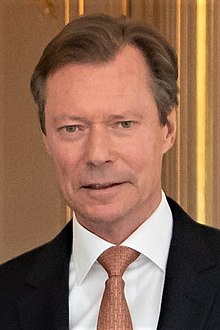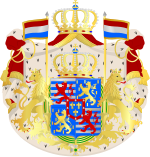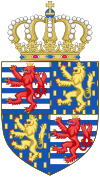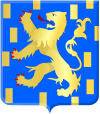Henri, Grand Duke of Luxembourg
This article needs additional citations for verification. (July 2021) |
| Henri | |||||
|---|---|---|---|---|---|
 Grand Duke Henri during an April 2019 visit by Georgian politician George Tsereteli | |||||
| Grand Duke of Luxembourg | |||||
| Reign | 7 October 2000 – present | ||||
| Predecessor | Jean | ||||
| Heir apparent | Guillaume | ||||
| Prime ministers | Jean-Claude Juncker Xavier Bettel | ||||
| Regency | 3 March 1998 – 7 October 2000 | ||||
| Born | 16 April 1955 Betzdorf Castle, Betzdorf, Luxembourg | ||||
| Spouse | |||||
| Issue Detail | |||||
| |||||
| House | Nassau-Weilburg (official) Bourbon-Parma (agnatic) | ||||
| Father | Jean, Grand Duke of Luxembourg | ||||
| Mother | Joséphine-Charlotte of Belgium | ||||
| Religion | Roman Catholic | ||||
| show |
|---|
Henri (French: Henri Albert Gabriel Félix Marie Guillaume,[1] pronounced [ɑ̃ˈʀi]; born 16 April 1955) is the Grand Duke of Luxembourg, reigning since 7 October 2000. He is the eldest son of Grand Duke Jean and Princess Joséphine-Charlotte of Belgium, and a first cousin of King Philippe of Belgium.
In 2019, Henri’s net worth was estimated around US$4 billion.[2]
Childhood[]
This section of a biography of a living person does not include any references or sources. (July 2020) |
Prince Henri was born on 16 April 1955, at the Betzdorf Castle in Luxembourg as the second child and first son of Hereditary Grand Duke Jean of Luxembourg and his wife, Princess Joséphine-Charlotte of Belgium. His father was the eldest son of Grand Duchess Charlotte of Luxembourg by her husband, Prince Félix of Bourbon-Parma. His mother was the only daughter of King Leopold III of Belgium by his first wife, Princess Astrid of Sweden. The prince's godparents were the Prince of Liège (his maternal uncle) and Princess Marie Gabriele (his paternal aunt).
Henri has four siblings: Archduchess Marie Astrid of Austria (born 1954), Prince Jean of Luxembourg (born 1957), Princess Margaretha of Liechtenstein (born 1957) and Prince Guillaume of Luxembourg (born 1963).
On 12 November 1964, when Henri was nine, his grandmother's abdication and his father's subsequent accession as grand duke made him heir apparent. As the grand duke's eldest son, he automatically took the title of hereditary grand duke.
Education[]
Henri was educated in Luxembourg and in France, where he obtained his baccalaureate in 1974, after which he undertook military officer training at the Royal Military Academy Sandhurst, England on the Standard Military Course (SMC) 7. He then studied political science at University of Geneva and the Graduate Institute of International Studies, graduating in 1980.[citation needed]
Marriage and family[]
This section of a biography of a living person does not include any references or sources. (July 2020) |
While studying in Geneva, Henri met the Cuban-born María Teresa Mestre y Batista, who was also a political science student. They married in Luxembourg in a civil ceremony on 4 February 1981 and a religious ceremony on 14 February 1981 with the previous consent of the grand duke, dated 7 November 1980. The couple has five children: Guillaume, Hereditary Grand Duke of Luxembourg, Prince Félix of Luxembourg, Prince Louis of Luxembourg, Princess Alexandra of Luxembourg, and Prince Sébastien of Luxembourg.
Constitutional position[]
This section of a biography of a living person does not include any references or sources. (July 2020) |


Prince Henri became heir apparent to the Luxembourg throne on the abdication of his paternal grandmother, Grand Duchess Charlotte of Luxembourg, on 12 November 1964. From 1980 to 1998, he was a member of the Council of State.
On 4 March 1998, Prince Henri was appointed as by his father, Grand Duke Jean, meaning that he assumed most of his father's constitutional powers. On 7 October 2000, immediately following the abdication of his father, Henri acceded as Grand Duke of Luxembourg and took the constitutional oath before the Chamber of Deputies later that day.
Euthanasia and constitutional reform controversies[]
On 2 December 2008 it was announced that Grand Duke Henri had stated he would refuse to give his assent to a new law on euthanasia that had been passed earlier in the year by the Chamber of Deputies.[3] Under the constitution then, the grand duke "sanctions and promulgates the laws" meaning the need for the grand duke's sanction or approval was required in order for laws to take effect. In the absence of clarity on the long-term implications for the constitutional position of the grand duke posed by such a refusal, it was announced by Prime Minister Jean-Claude Juncker that a constitutional amendment would be brought forward.[citation needed]
The Luxembourg ruling house had tried to block a decision by parliament only once before, when Grand Duchess Marie-Adelaide refused to sign a bill in 1912 to reduce the role of Roman Catholic priests within the education system.[4] The ultimate solution was that the grand duke would be declared unable to perform his duty temporarily; this was similar to the "escape route" provided to his uncle King Baudouin of Belgium when he refused to sign an abortion law in 1991, and thus the law could take effect without the signature of the grand duke, but also without the need to enact far-reaching changes in the constitution.[citation needed]
Article 34 of the constitution was subsequently amended to remove the term "assent",[5] leaving the relevant provision to read: "The Grand Duke promulgates the laws..." As a result, his signature is still needed but it is clear that his signature is automatic and that he has no freedom of decision. The head of state no longer has to "sanction" laws for them to take effect; he merely promulgates them.[6]
Role and interests[]
This section of a biography of a living person does not include any references or sources. (June 2018) |

As the head of a constitutional monarchy, Grand Duke Henri's duties are primarily representative. However, he retains the constitutional power to appoint the prime minister and government, to dissolve the Chamber of Deputies, to promulgate laws and to accredit ambassadors.
Grand Duke Henri is commander-in-chief of the Luxembourg Army, in which he holds the rank of general. He is also an honorary major in the British RAF Regiment.
One of the grand duke's main functions is to represent Luxembourg in the field of foreign affairs. In May 2001, Grand Duke Henri and Grand Duchess Maria Teresa undertook their first foreign state visit to Spain at the invitation of King Juan Carlos and Queen Sofia.
Grand Duke Henri is a member of the International Olympic Committee, a member of The Mentor Foundation (established by the World Health Organization) and a director of the Charles Darwin Trust for the Galápagos Islands.
The grand duke lives with his family at Berg Castle in Luxembourg. He also has a holiday home in Cabasson, near Bormes-les-Mimosas in south France.
Media and publicity[]

Since the accession of Henri to the Grand Ducal Throne in 2000, the court's approach to media and publicity has varied markedly.[citation needed] In 2002, Grand Duke Henri expressly identified himself with a press conference called by Grand Duchess Maria Teresa with a view to discussing with journalists the shortcomings of her personal relations with her mother-in-law Grand Duchess Joséphine-Charlotte.[citation needed]
In contrast, when the grand ducal couple's first grandchild was born in 2006, the Court Circular pointedly omitted to mention the event, probably as the father Prince Louis was not married at the time.[citation needed] However, the pregnancy was announced in 2005, so the country was informed that the prince and his girlfriend were going to be parents. The press also had access to the child's baptism.[citation needed]
The grand ducal family's approach to media and publicity issues has given rise to media comment regarding the quality of communications advice which has been sought and followed.[citation needed] As well as the public airing of the difficulties between the grand duchess and her mother-in-law, several other events have resulted in adverse publicity, most notably: in 2004, the opening of parliament by the grand duke in person, the first time in over 100 years the monarch had done so; in 2005, the grand duke announced he intended to vote in favour of the European Constitution in the impending referendum, only to be reminded by senior politicians that he had no such right; the proposed sale of large tracts of the Gruenewald in the summer of 2006 shortly followed by the proposed sale (cancelled shortly afterwards) at Sotheby's of recently deceased Grand Duchess Joséphine-Charlotte's effects.[7]
Waringo report[]
On 31 January 2020 the Waringo report was released, a governmental report on the internal workings of the monarchy that had been compiled by Jeannot Waringo, former Financial Director of Luxembourg.[8] The report identified significant problems in terms of staff management at the Palace resulting in a high turnover rate and an atmosphere of fear. It noted that internal communications were almost nonexistent. Waringo indicated that the most important staff decisions were made by the Grand Duchess. There was no division of staff for personal use and that for official functions. Waringo was also not able to determine if the royal couple's private activities were financed by the State or not.[8] The report calls for a reform of the monarchy.[9] The Court responded that "(i)n the interests of greater transparency and modernization, the Court will contribute constructively to the implementation of the improvements proposed in this report."[9]
Health[]
This section of a biography of a living person does not include any references or sources. (June 2018) |
On 3 February 2011, Henri was admitted to the Centre Hospitalier de Luxembourg on falling ill. Shortly after, the issued a statement saying that he was to undergo an angioplasty. The day after, the communications chief announced that the procedure had been a success. "The state of His Royal Highness' health is not disturbing," the statement read, before stating the grand duke may leave the hospital within the next few days. Although the reason has not formally been disclosed, it is reported that the grand duke felt ill after waking that day, and the court physician noticed circulation problems. It was then that he was rushed to hospital, to the cardiac unit, and was discharged the following day.
Honours[]
National[]
 Co-Grand Master and Knight of the Order of the Gold Lion of the House of Nassau
Co-Grand Master and Knight of the Order of the Gold Lion of the House of Nassau Grand Master and Grand Cross of the military and civil Order of Adolphe of Nassau
Grand Master and Grand Cross of the military and civil Order of Adolphe of Nassau Grand Master and Grand Cross of the Order of the Oak Crown
Grand Master and Grand Cross of the Order of the Oak Crown Grand Master of the Order of Merit of the Grand Duchy of Luxembourg
Grand Master of the Order of Merit of the Grand Duchy of Luxembourg- Grand Collar of the European Foundation of Merit
Foreign[]
This article needs additional citations for verification. (July 2020) |
 Austria: Grand Star of the Decoration of Honour for Services to the Republic of Austria
Austria: Grand Star of the Decoration of Honour for Services to the Republic of Austria Belgium: Grand Cordon of the Order of Leopold (1994)
Belgium: Grand Cordon of the Order of Leopold (1994) Brazil:
Brazil:
- Grand Cross of the Order of the Southern Cross
- Grand Collar of the Order of the Southern Cross (3 December 2007)[10]
 Cape Verde: Member 1st Class of the Amílcar Cabral Order (12 March 2015)
Cape Verde: Member 1st Class of the Amílcar Cabral Order (12 March 2015) Denmark: Knight of the Order of the Elephant[11]
Denmark: Knight of the Order of the Elephant[11] Estonia: Collar of the Order of the Cross of Terra Mariana (5 May 2003)[12]
Estonia: Collar of the Order of the Cross of Terra Mariana (5 May 2003)[12] France: Grand Cross of the Order of the Legion of Honour
France: Grand Cross of the Order of the Legion of Honour Finland: Grand Cross with Collar of the Order of the White Rose of Finland (November 2008)
Finland: Grand Cross with Collar of the Order of the White Rose of Finland (November 2008) Germany: Grand Cross Special Class of the Order of Merit of the Federal Republic of Germany
Germany: Grand Cross Special Class of the Order of Merit of the Federal Republic of Germany Greece: Grand Cross of the Order of the Redeemer (July 2001)[13]{
Greece: Grand Cross of the Order of the Redeemer (July 2001)[13]{ Italy: Knight Grand Cross with Collar of the Order of Merit of the Italian Republic (14 March 2003)
Italy: Knight Grand Cross with Collar of the Order of Merit of the Italian Republic (14 March 2003) Japan: Collar of the Supreme Order of the Chrysanthemum (27 November 2017)
Japan: Collar of the Supreme Order of the Chrysanthemum (27 November 2017) Latvia: Commander Grand Cross with Chain of the Order of the Three Stars (5 December 2006)[14]
Latvia: Commander Grand Cross with Chain of the Order of the Three Stars (5 December 2006)[14] Mali: Grand Cross of the National Order of Mali (9 November 2005)
Mali: Grand Cross of the National Order of Mali (9 November 2005) Netherlands:
Netherlands:
- Grand Cross of the Order of the Crown
- Knight Grand Cross of the Order of the Netherlands Lion (24 April 2006)
 Norway: Grand Cross with Collar of the Order of St. Olav (18 April 1996)
Norway: Grand Cross with Collar of the Order of St. Olav (18 April 1996) Poland: Knight of the Order of the White Eagle (2014)[15]
Poland: Knight of the Order of the White Eagle (2014)[15] Portugal:
Portugal:
- Grand Collar of the Order of Prince Henry (6 May 2005)[16]
- Grand Collar of the Military Order of Saint James of the Sword (7 September 2010)[17]
- Grand Collar of the Order of Liberty (23 May 2017)[18]
 Romania: Collar of the Order of the Star of Romania (2004)[19]
Romania: Collar of the Order of the Star of Romania (2004)[19] Senegal: Grand Cross of the National Order of the Lion (2018)
Senegal: Grand Cross of the National Order of the Lion (2018) Slovakia: Grand Cross (or 1st Class) of the Order of the White Double Cross (2002)[20]
Slovakia: Grand Cross (or 1st Class) of the Order of the White Double Cross (2002)[20] SMOM: Bailiff Grand Cross of Honour and Devotion of the Sovereign Military Order of Malta
SMOM: Bailiff Grand Cross of Honour and Devotion of the Sovereign Military Order of Malta Spain:
Spain:
- Knight of the Order of the Golden Fleece (13 April 2007)[21][22]
- Collar of the Order of Charles III (11 May 2001)[22][23]
- Grand Cross of the Order of Charles III (8 July 1980)[24]
 Sweden:
Sweden:
- Knight of the Order of the Seraphim (12 September 1983)
- Recipient of the 50th Birthday Badge Medal of King Carl XVI Gustaf
 Turkey: Member of the Order of the State of Republic of Turkey (19 November 2013)[25]
Turkey: Member of the Order of the State of Republic of Turkey (19 November 2013)[25] United Kingdom: Honorary Knight Grand Cross of the Royal Victorian Order
United Kingdom: Honorary Knight Grand Cross of the Royal Victorian Order Vatican: Knight with the Collar of the Order of Pope Pius IX
Vatican: Knight with the Collar of the Order of Pope Pius IX
References[]
- ^ "Grand Duke Henri (b. 1955)" Archived 4 May 2017 at the Wayback Machine, The official portal of the Grand Duchy of Luxembourg.
- ^ Hoffower, Hillary. "Meet the 10 richest billionaire royals in the world right now". Business Insider.
- ^ "Luxembourg strips monarch of legislative role". 12 December 2008.
- ^ Péporté, Pit (2010). Inventing Luxembourg: representations of the past, space and language from the nineteenth to the twenty-first century. BRILL. p. 90. ISBN 978-90-04-18176-2.
- ^ "Loi du 12 mars 2009 portant révision de l'article 34 de la Constitution. - Legilux". data.legilux.public.lu. Retrieved 16 February 2018.
- ^ "Luxembourg to reduce duke's power", BBC News, 3 December 2008.
- ^ Revue 10 December 2008, Editions Revue S.A., Luxembourg
- ^ Jump up to: a b ""The monarchy's functioning must be reformed"". RTL Today. 31 January 2020. Retrieved 5 February 2020.
- ^ Jump up to: a b Brittani Barger (31 January 2020). "Waringo Report reveals a culture of fear dominates Luxembourg's Grand Ducal Court". Royal Central. Retrieved 5 February 2020.
- ^ DECRETO DE 3 DE DEZEMBRO DE 2007 - website JusBrasil
- ^ "Modtagere af danske dekorationer". kongehuset.dk (in Danish). 12 December 2017. Retrieved 5 May 2019.
- ^ Estonian State decorations, 05/05/2003
- ^ www.gouvernement.lu/ , State visit of President Stephanopoulos in Luxembourg, July 2001
- ^ Latvian Presidency, Recipients list (.doc) Archived 2 May 2013 at the Wayback Machine
- ^ President's decision M.P. z 2014 r. poz. 728
- ^ Alvará n.º 23/2005. Diário da República n.º 218/2005, Série II de 2005-11-14
- ^ Alvará (extracto) n.º 16/2010. Diário da República n.º 219/2010, Série II de 2010-11-11. p.55733.
- ^ Alvará (extrato) n.º 7/2017. Diário da República n.º 133/2017, Série II de 2017-07-12, p. 14444
- ^ Romanian Presidency website, Recipients of the order (Excel sheet)
- ^ Slovak republic website, State honours (click on "Holders of the Order of the 1st Class White Double Cross" to see the holders' table): 1st Class received by Grand-Duke in 2002, i.e. during the state visit Archived 16 October 2007 at the Wayback Machine (French) of President Rudolf Schuster in Luxembourg (november 2002).
- ^ Real Decreto 474/2007. Boletín Oficial del Estado núm. 90, de 14 de abril de 2007, p. 16516
- ^ Jump up to: a b Spanish Royal Family website, State visit of Juan Carlos & Sofia in Luxembourg, April 2007, Photo of the Sovereign couples
- ^ Real Decreto 525/2001. Boletín Oficial del Estado núm. 114, de 12 de mayo de 2001, p. 17204
- ^ Real Decreto 3198/1980. Boletín Oficial del Estado núm. 109, de 7 de mayo de 1981, p. 9813
- ^ "Grand Duke Henri of Luxembourg at the Çankaya Presidential Palace". Presidency of the Republic of Turkey. 19 November 2013. Retrieved 22 November 2013.
External links[]
| Wikimedia Commons has media related to Henri, Grand Duke of Luxembourg. |
- 1955 births
- 20th-century Roman Catholics
- 21st-century Roman Catholics
- Grand Dukes of Luxembourg
- International Olympic Committee members
- Living people
- House of Nassau-Weilburg
- Luxembourgian Roman Catholics
- Members of the Council of State of Luxembourg
- People from Betzdorf, Luxembourg
- Graduates of the Royal Military Academy Sandhurst
- University of Geneva alumni
- Graduate Institute of International and Development Studies alumni
- Grand Crosses of the Order of Merit of the Grand Duchy of Luxembourg
- Knights of the Golden Fleece of Spain
- Recipients of the Grand Star of the Decoration for Services to the Republic of Austria
- Recipients of the Collar of the Order of the Cross of Terra Mariana
- Knights Grand Cross with Collar of the Order of Merit of the Italian Republic
- Knights Grand Cross of the Order of Pope Pius IX
- Knights of Malta
- Grand Crosses of the National Order of Mali
- Grand Collars of the Order of Saint James of the Sword
- Grand Crosses of the Order of Saint James of the Sword
- Grand Collars of the Order of Prince Henry
- Grand Crosses of the Order of Prince Henry
- Grand Crosses of the Order of the Star of Romania
- Honorary Knights Grand Cross of the Royal Victorian Order
- Grand Collars of the Order of Liberty
- Luxembourgian billionaires






